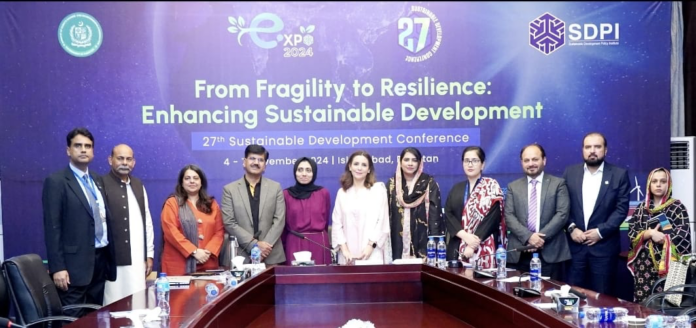ISLAMABAD: Pakistan is seeking a $13 million grant from the World Health Organization (WHO) to enhance training programs aimed at strengthening climate resilience in the country’s health systems.
This request follows a vulnerability assessment survey completed with international support, highlighting the pressing need to adapt healthcare infrastructure to climate risks.
Dr. Mehreen Mujtaba, Director of Nutrition at the Ministry of National Health Services, announced during the conference that Pakistan is planning to introduce a National Health Adaptation Plan to address climate-related health vulnerabilities.
The conference, titled “Building Resilient Health Systems in the Wake of Climate Crisis in South Asia,” was organized by the Sustainable Development Policy Institute (SDPI) and brought together experts from across the region to evaluate climate-related risks and their health implications.
Dr. Mujtaba reaffirmed Pakistan’s commitment to global health initiatives, noting that the Ministry of National Health Services has endorsed a health declaration at COP-28, targeting the impacts of climate change on health. “Climate change presents significant health risks that our healthcare system must be prepared to handle,” she stated, emphasizing Pakistan’s active role in climate adaptation.
Panelists stressed the need for a strong, sustainable financial framework to support adaptation efforts. “The health sector must evolve to meet these challenges head-on,” said Dr. Meghnath Dhimal, Environmental Health Scientist from Nepal. He pointed to rising cases of heat-related illnesses, vector-borne diseases, and respiratory problems exacerbated by air pollution. Dr. Dhimal advocated for “a comprehensive approach that integrates climate adaptation into health planning.”
Other notable speakers included Dr. Robert Marten from AHSPR in Geneva, and Dr. Upasona Ghosh of the Public Health Foundation of India.
They highlighted the urgent need for dedicated funds to finance climate-resilient health infrastructure. “Investing in these systems not only protects public health but also enhances economic stability,” said Dr. Syed Manzoor Ahmed Hanifi from Bangladesh’s ICDDR-B.
The panelists urged collaboration among governments, NGOs, and private sectors, stressing that a resilient health system is essential to protecting vulnerable populations as climate crises continue to escalate in South Asia.
























